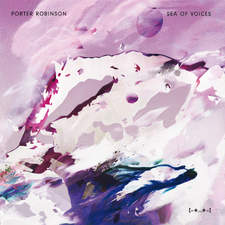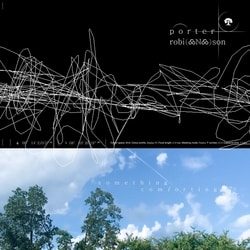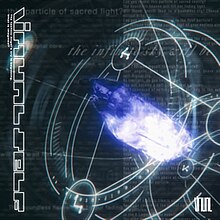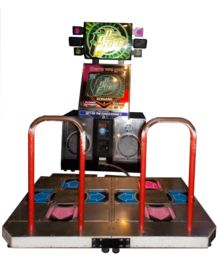
Astralwerks is an American record label primarily focused on electronic music that is now owned by Universal Music Group. Its material is distributed via Capitol Music Group in the United States. The label was founded in 1993 and, in its early years, featured prominent British acts like The Future Sound of London, Fatboy Slim and The Chemical Brothers. In recent years, its roster has expanded to include acts like Halsey, Marshmello, Porter Robinson, Illenium, Zhu and numerous others. In 2018, Astralwerks' headquarters were moved from its original home of New York City to Los Angeles.

"Shelter" is a song by American DJ and record producer Porter Robinson and French DJ and record producer Madeon, released as a single on August 11, 2016. In October 2016, a music video, produced in collaboration with A-1 Pictures, was released.

Throughout his career, Dutch electronic DJ and producer Tiësto has released seven studio albums. After spending years searching for his personal style and working with DJs like Ferry Corsten, Benno de Goeij and Armin van Buuren, he decided it was time to focus on his solo work. Tiësto's fame started to rise in the late 1990s after his set at the first ID&T Innercity party, and it continued to skyrocket in the early 2000s following his six-hour "Tiësto Solo" sets, which he performed without any other DJs or opening acts. His last three full-length releases broke the 70,000-unit mark, and the 2003 DJ mix Nyana hit 87,000, according to Nielsen SoundScan in mid-2008.

Matan Zohar, better known by his stage name Mat Zo, is a British DJ and electronic music producer. Zohar released his debut album, Damage Control, via the Anjunabeats and Astralwerks labels on 5 November 2013. His second studio album, Self Assemble, was released on 25 March 2016 under his own Mad Zoo label.

Porter Weston Robinson is an American DJ, record producer, and singer-songwriter. Born in Atlanta, Georgia and raised in Chapel Hill, North Carolina, Robinson began producing electronic music during his adolescence. He signed to Skrillex's record label OWSLA at the age of 18, and released the extended play Spitfire in 2011. He appeared on Billboard's 21 Under 21 list in 2012.

Worlds is the debut studio album by the American electronic music producer Porter Robinson, released on August 12, 2014, by Astralwerks. Initially known for his heavier bass-centric production, Robinson became increasingly dissatisfied with the electronic dance music (EDM) genre, believing it limited his artistic expression. In 2012, Robinson released his first song with a greater emphasis on melody, "Language", and decided thereafter to prioritize aesthetic and emotional qualities in his work. He was inspired by media that evoked nostalgia for his childhood, and wrote music integrating elements taken from anime, films, and sounds from 1990s video games.

"Sea of Voices" is a song recorded by American electronic music producer Porter Robinson. It was released on March 2, 2014, as the first single from his debut studio album Worlds (2014), and features uncredited vocals from Breanne Düren. After becoming dissatisfied with the electronic dance music of his prior discography, Robinson decided to alter his style to prioritize aesthetic and emotional qualities in his work. Although Robinson released the song without any leading marketing in an effort to surprise his fans, it was well-received by audiences, becoming a trending topic on Twitter and charting on the Billboard US Hot Dance/Electronic Songs. Critics highlighted the song's atmospheric production and unusual compositional structure. Robinson would later cite "Sea of Voices" as an inspiration on his later single "Unfold" (2021).

"Lionhearted" is a song recorded by the American electronic music producer Porter Robinson featuring the Swedish indie pop band Urban Cone for his debut studio album, Worlds (2014). It was one of the first songs Robinson wrote for the album. He decided to work with Urban Cone after listening to their vocals and finding them adequate for the song. After being premiered by Stereogum and at BBC Radio 1, it was released on June 17, 2014, as the album's third single Multiple critics found the song influenced by Passion Pit and noted that it was the first on Worlds with a faster tempo. The song's release was accompanied by a music video, set in city streets. It charted in Belgium and the United States.

Daniel Goldstein, better known by his stage name Lane 8, is an American musician, DJ, and electronic music producer. Currently residing in Denver, Colorado, he is signed to English deep house label Anjunadeep. Pete Tong named Lane 8 a "Future Star" and Dancing Astronaut included him in their '25 Artists to Watch in 2015'. His debut studio album Rise, was released on July 17, 2015. More recently, he has been releasing music through his own label This Never Happened.
Nicholas Chiari, commonly known by his stage name Grabbitz, is an American electronic music producer, musician, composer, and DJ. He first gained attention in the EDM community with the song "Here with You Now", which was released on Monstercat in July 2014. He has collaborated with a variety of artists, including Savoy, Sullivan King, and Pegboard Nerds.
Louis the Child is an American electronic music group consisting of Robby Hauldren and Frederic J. Kennett.

The discography of American musician Porter Robinson consists of two studio albums, one remix album, two live albums, nine extended plays, thirty-one singles, and eighteen music videos. He first released music under Ekowraith in 2008, starting with "Booming Track".

Sajeeb Saha, known professionally as Jai Wolf, is a Bangladeshi producer. He is best known for his singles, "Indian Summer", "Like It's Over", and "Starlight". He is currently signed to Mom + Pop Music.
"Ghost Voices" is a song by American electronic music producer Porter Robinson under the alias Virtual Self. It was released on November 8, 2017 as the second single from the alias' self-titled debut EP, which uses early 2000s sounds and aesthetics. Robinson said that "Ghost Voices" was the easiest song from the EP to compose, and he used a house-styled drum pattern and a trance-styled break. In 2018, the song received an official music video and was remixed by Raito and Robinson himself, the latter remix being called "Angel Voices". "Ghost Voices" received a nomination for Best Dance Recording at the 61st Annual Grammy Awards.
David Andrew Lunson, known as 1788-L, is an American DJ, electronic music producer. He rose to fame in 2018 with a remix of Virtual Self's "Particle Arts" uploaded onto his SoundCloud account. Other releases following this include "Multiverse" and a remix of Daft Punk's "Rinzler".

Nurture is the second studio album by American electronic music producer Porter Robinson, released on April 23, 2021 by Mom + Pop Music. The album was written in the years following Robinson's debut album Worlds (2014), a period when Robinson struggled with mental illness and writer's block. As a result, the album represents a significant stylistic shift in his work; critics noted that the album features a greater emphasis on acoustic instruments and personal lyrics, while retaining many elements of the innovative electronic style of Worlds. The album also prominently features Robinson's voice, as well as a processed, higher-pitched version. The album features themes of depression, and of learning to find beauty in everyday life and the natural world. Several songs also explore themes of family and love for the first time in Robinson's discography.

"Something Comforting" is a song recorded by American electronic music producer Porter Robinson. Released on March 10, 2020 as the second single from his second studio album Nurture, the song was written and produced by Robinson himself. Robinson also provided the vocals for the track. The song is representative of Robinson's struggles with creative blocks and depression.

"Look at the Sky" is a song by American electronic music producer Porter Robinson. It was released on January 27, 2021, as the fourth single from his second studio album Nurture. The song is featured in the soundtrack of the video game Forza Horizon 5, on the Horizon Pulse radio station. It is also featured as a playable song in the arcade game Dance Dance Revolution A3, as well as the online Battle Royale video game Fortnite as a lobby music track in collaboration with Coachella 2023.

"Everything Goes On" is a single by American electronic music producer Porter Robinson, released in collaboration with video game League of Legends on July 14, 2022. It is Robinson's first release since his album Nurture (2021).

Smile! :D is the upcoming third studio album by American electronic music producer Porter Robinson, set to be released on July 26, 2024. Four singles, "Cheerleader", "Knock Yourself Out XD", "Russian Roulette", and "Kitsune Maison Freestyle" were released to promote the work. It will be supported by a world tour in 2024 and 2025.




















